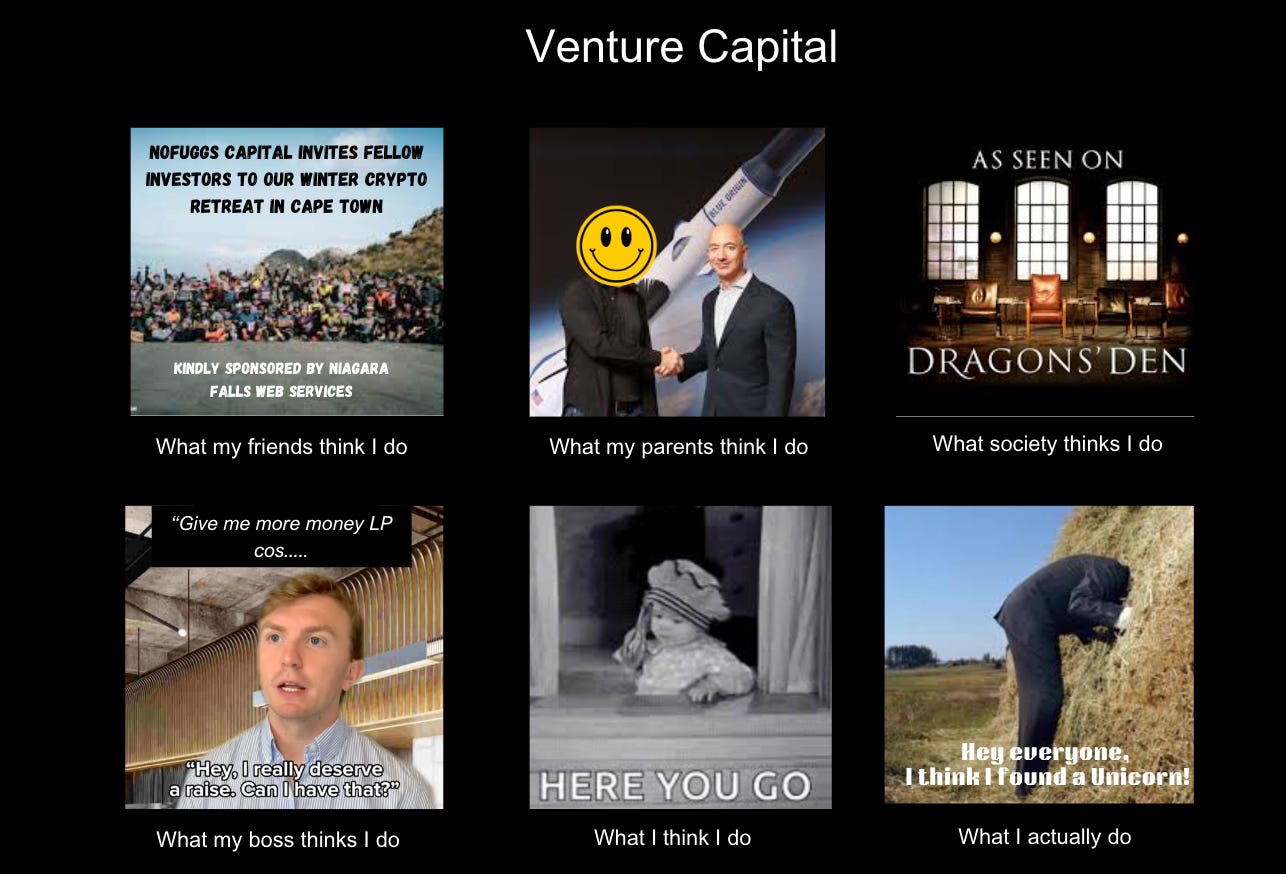What actually makes a “great” VC? Decoding Greatness in Venture Capital: Part 2
There has been a popular meme flying about social media:
“What my friends think I do”
“What my parents think I do”
“What my society thinks I do”
Etc.
This meme captures how deeply perspective can shape thought.
Since the first blog post, I have asked several people what constitutes greatness in a venture capitalist (VC). Responses diverged significantly based on the stakeholder queried. From tech founders seeking funding to limited partners (LPs) investing capital, opinions vary widely:
Tech Founder raising pre-seed: “They ask interesting questions during the first interview meeting.”
Tech Founder currently raising Seed: “A great investor is someone who moves fast and pays up.”
LP: “Intellectual honesty”
Early-stage junior investor: “A great investor is one that achieves the strategy they committed to their LPs.”
Early-Late junior investor: “As much honesty as possible in communication with founders.”
Note the juxtaposition of the last two opinions!
VCs act within an ecosystem involving three different types of stakeholders:
Limited Partners (those that give you money)
Founders (those who you give money to)
Other investors (whom you share risk with)
In Part I of this blog post, I broke down the collective actions that are expected of VCs to achieve the desired outcome of significant returns to all stakeholders involved (founders, LPs, themselves).
Raise funds
Find founders to invest in
Win the deal
Support portfolio
Exit well
But how do VCs actually achieve these goals and how much impact do they really have on the likelihood of any of these desired outcomes?
Moreover is there a difference between what is perceived as value versus what is ACTUALLY valuable? And how do these perceptions vary from stakeholder to stakeholder?
I've been thinking about these questions since writing my last essay and I've come up with three characteristics that I think ACTUALLY make a great VC, perception be damned!
Great VCs:
Identify founders who are capable of successfully pitching the vision of a successful business
Have the capability to persuade others that their viewpoints are worth adopting
Have a sixth sense on when to exit
The second of the three points arguably holds the most weight.
VCs wield significant influence in shaping perceptions within the startup ecosystem. If a certain VC becomes the ‘tastemaker’ to the start up ecosystem, then in all sense in purposes they have significant control over which companies get invested in over others.
Statistically, it is more likely for companies to raise a Series A (and with a bigger valuation), if their Seed round is led by a top tier fund. This fact demonstrates the value of viewpoints and how valuations can be determined so much by the ‘vision’ and less so by the actual numbers. An obvious example is WeWork, at its peak, was valued at $47billion, and has never once turned a profit, in fact, WeWork reported total debts of $18.65 billion against total assets of $15.06 billion in a bankruptcy initial filing in 2023.
Most ‘great’ companies experience dips in valuation, just look at any Fortune 500 company’s share prices over time. A great VC has mastered the combined ability to ignite a FOMO frenzy and maximise gains more often than not. It is a never-ending game of how high can you go whilst avoiding the unceremonious fall from grace, something that FTX has taught us can happen in the blink of an eye.
Drawing back to the exercise of evaluating perceived versus actual value, the VC landscape hinges on perceived future potential, where those possessing the aforementioned traits excel. However, in terms of quantifiable contribution to success (i.e., profitability), their impact may be less pronounced.
Because top VCs conjure up the most convincing illusions, they no doubt play a pivotal role in shaping the future trajectory of startups, however, I would not bet on their ability to ensure actual sustained profitability. Thus leads us to the question of how much does hype actual contribute towards long term sustained profitability…. evidence suggests not a lot……..
Enjoy this illusion ;)





